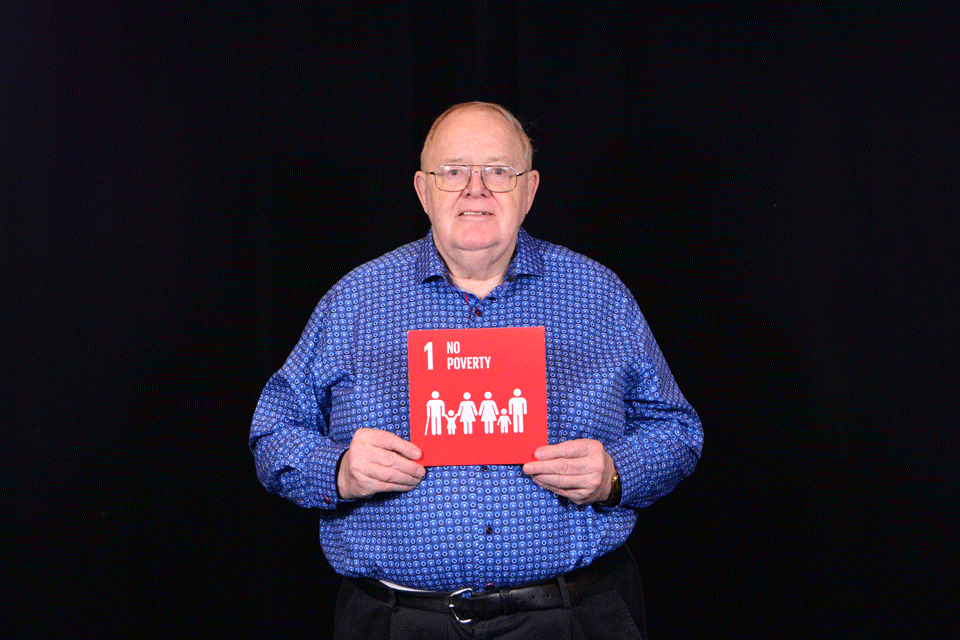UN Sustainable Development Goals

As centres of knowledge and innovation, universities have a major role to play in developing solutions to global issues. This is why the UN Sustainable Development Goals (SDGs) are an important aspect of the work we do at UAI and why we are so proud of the University’s THE Impact Ranking. We think it's critical for everyone in our community to understand what the SDGs are - so we raise awareness about them and aim to inspire and motivate people to take action towards their achievement.
“At the University of Alberta, we have a tremendous amount of work taking place already that contributes to the SDGs. At the same time, as one of the country’s leading research and teaching institutions and a leading international university, it is clear that there are major opportunities to achieve even greater impact. The 17 goals are a part of every person’s life in Canada and globally. We need to educate, raise awareness, and seek our own ways to contribute.”
Dr. Cen Huang, Vice-Provost and Associate Vice-President (International)
Consider This: The UN’s Sustainable Development Goals are for everyone — here’s why
About the UN Sustainable Development Goals
The SDGs were unanimously adopted by all 193 UN member states in 2015. They are universal and apply to all countries. The international community aims to achieve these goals, also known as the Global Goals, by 2030. The SDGs are about People, Planet, Prosperity, Peace and Partnerships. The 17 SDGs have 169 targets, and Canada has developed its own indicators to measure progress in achieving them (Towards Canada's 2030 Agenda National Strategy).
Learn more about how the University is contributing to the achievement of the SDGs from U of A's Sustainability Council.
U of A International and the UN Sustainable Development Goals
UAI is committed to being a champion for forwarding the SDGs both on campus and beyond. Following are some of the many ways we are advancing the SDGs in our work with local, national, and global communities.
Since 2008, UAI’s Sponsored Student Program has developed co-funding partnerships with scholarship providers around the world to expand the opportunities for international students to enrol in UAlberta degree programs. Partners include foreign governments, charitable foundations, companies, and academic institutions. (SDG 4)
Partnerships for the Goals
As global engagement specialists, UAI continues to seek out innovative opportunities for the U of A to collaborate with our international partners on initiatives that raise awareness and contribute to addressing the SDGs.
In the News
- U of A computing scientists work with Japanese researchers on virtual reality game to get people out of their seats (SDG3)
- U of A strengthens ties with India to tackle global energy, climate challenges (SDG 7)
- University of Alberta joins 56 global universities in pursuit of the United Nations Sustainable Development Goals (SDG 17)
- UAlberta joins new global network to tackle energy solutions (SDG 7)
Featured Partnerships
- In 2023, U of A partnered with The Energy and Resources Institute (TERI) and the High Commission of Canada in New Delhi to jointly organize a workshop on The Future of Energy: Energy Transition, New Energy Solutions and Climate Change. (SDG 7)
- In 2020-22, U of A partnered with the University of Texas at Austin and the Tecnologico de Monterrey on the North American Energy Dialogue, a series of cross-sectoral panel discussions featuring insights from experts in Canada, the USA, and Mexico, providing analysis on energy policy and transition. (SDG 7)
- Established in 2017, the China-based UAlberta-Tsinghua Joint Centre for Future Energy and Environment brings together Tsinghua University’s Low Carbon Energy Laboratory and U of A's Future Energy Systems initiative to develop new sources of energy to power humanity's future while minimising impacts on air, water and land. (SDG 7)
Featured Projects
- The Canada – Pacific Alliance Scholarship Program (2016-2021), managed by UAI and funded by the Government of Canada, provided scholarships to government employees with responsibility for management/oversight of the extractive resource sector in the Pacific Alliance member nations (Chile, Colombia, Mexico, Peru). The scholarships supported trainees to register in professional Master’s or certificate programs, or professional development short courses, offered by Canadian universities, on topics related to sustainable extractive sector management. (SDG 12)
- The Oman Ministry of Education Teacher Training Project (2016-2018), managed by UAI and undertaken with experts from our Faculty of Education, developed a series of training modules for the Ministry of Education’s Specialised Centre for Professional Training of Teachers. The training modules were designed to build the capacity of 10,000 in-service primary school maths and science teachers across the Sultanate, and ultimately lead to better learning outcomes for Omani students. (SDG 4)
